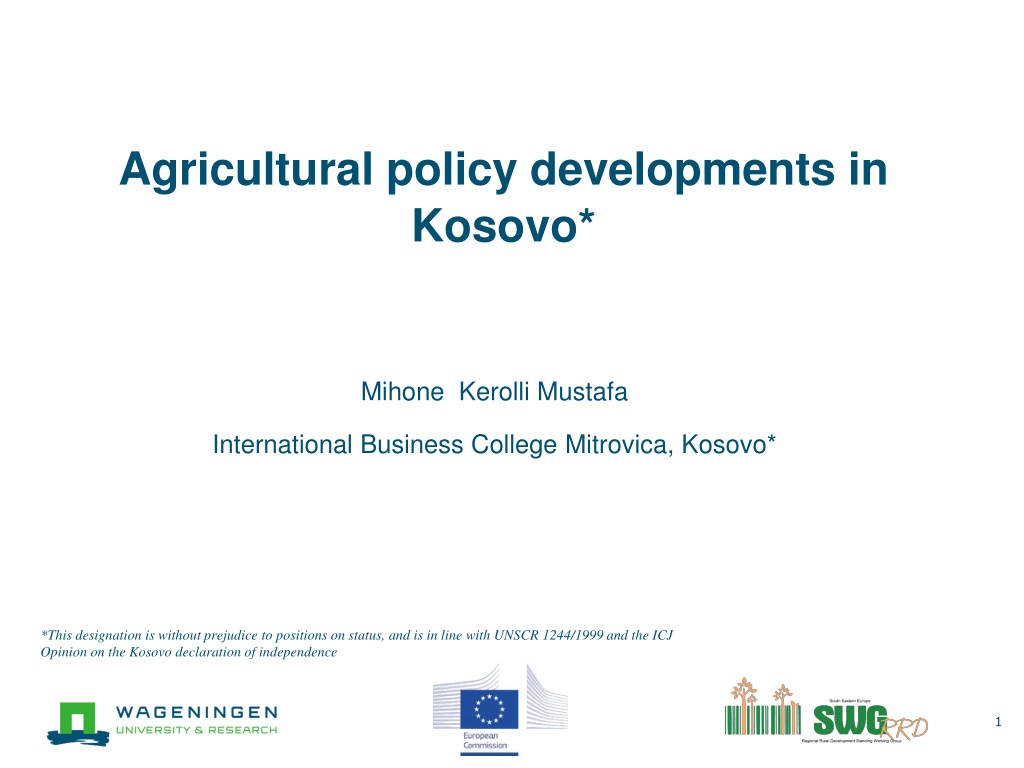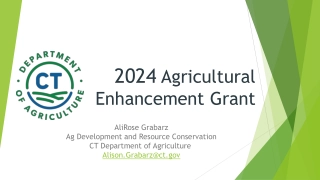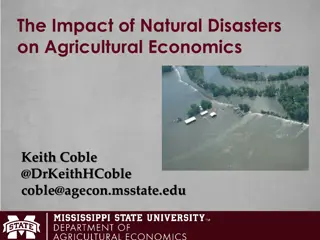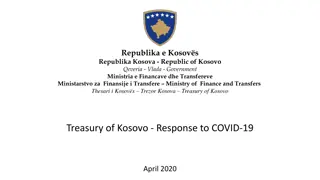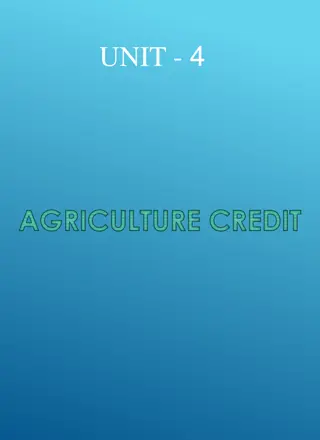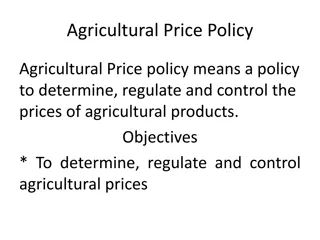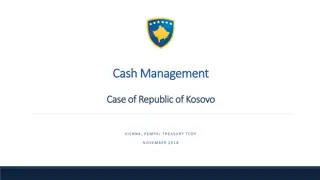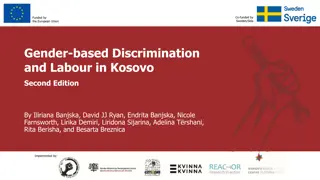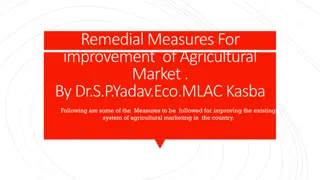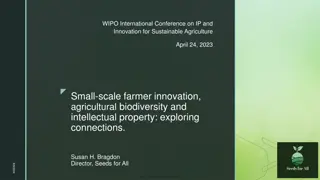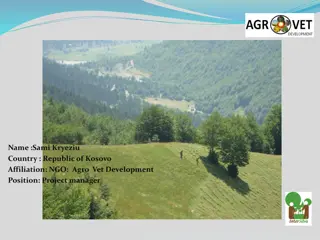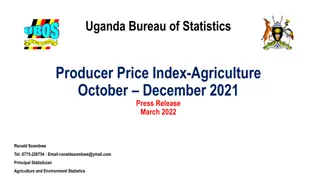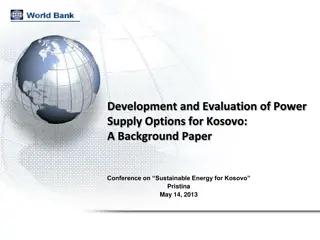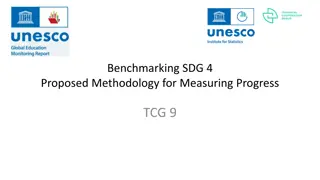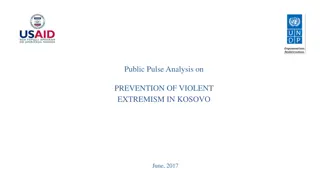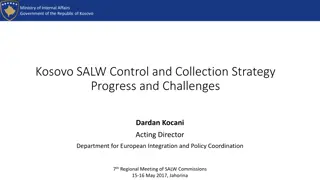Agricultural Policy Developments in Kosovo - Progress and Challenges
The Covid-19 pandemic has posed financial stability risks in Kosovo. The agricultural sector saw positive growth in 2020, but progress in agricultural and rural development programs remains limited. Urgent measures are needed to prevent the loss of agricultural land and align legislation with EU standards.
Download Presentation

Please find below an Image/Link to download the presentation.
The content on the website is provided AS IS for your information and personal use only. It may not be sold, licensed, or shared on other websites without obtaining consent from the author. Download presentation by click this link. If you encounter any issues during the download, it is possible that the publisher has removed the file from their server.
E N D
Presentation Transcript
Agricultural policy developments in Kosovo* Mihone Kerolli Mustafa International Business College Mitrovica, Kosovo* *This designation is without prejudice to positions on status, and is in line with UNSCR 1244/1999 and the ICJ Opinion on the Kosovo declaration of independence 1
Content Introduction Agricultural policy framework Measures and budgetary support of agriculture and rural development Covid-19 interventions in policy and implications Greener policy instruments and measures linked to climate change, biodiversity loss and management of natural resources EU approximation process Next steps 2
Introduction The Covid-19 pandemic has significantly increased the risks to financial stability in Kosovo*. Gross domestic product by economic activities in 2020 for the agriculture was 7.4%. Gross value added, which represents the difference between the value of production of the agricultural industry and the value of intermediate consumption, in 2020 was worth 512 mil , where compared to the previous year recorded an increase of 7%. In 2020, gross value added was equal to 62% of output value. The highest value of income in agriculture was in 2020 where entrepreneurial income was 9% higher than in the previous year. Gross value added and net value added in agriculture income was increased by 7% and 9% respectively in 2020 and 2021.
Agricultural policy framework Kosovo* Progress report 2021 states that Kosovo* has some level of preparation on agriculture and rural development. Limited progress was made overall, especially in relation to the design and implementation of the agriculture and rural development programmes. Progress on land consolidation and land protection is insufficient. Kosovo* should in particular: perform a qualitative assessment of the effectiveness of direct payments and rural development programmes provided under the financial framework 2014-2020, and adopt the strategy and program for agricultural and rural development 2021-2027; take urgent and effective measures to stop the loss of agricultural land and implement the legislation on spatial planning 4
Agricultural policy framework II Kosovo* s institutional set-up includes the necessary system for the development and implementation of agriculture and rural development policy. The positive trend with respect to budget allocation for direct payments and grants continued in 2020: the allocation rose to EUR 61.6 m, 35% higher than in 2019. The agriculture and rural development programme 2020 included important support for agricultural households, processing and marketing of agricultural products, farm diversification and irrigation of agricultural land. Cross-compliance and common market organisation (CMO) remains unaddressed. The Ministry of Agriculture initiated the preparation of the agriculture and rural development program 2021-2027. The quality policy, some secondary legislation was adopted but no progress was registered in aligning the relevant legislation with the EU acquis. Organic farming is governed by the 2018-2021 action plan for organic agriculture. 5
Agricultural policy developments III Kosovo* has some level of preparation in the area of food safety, veterinary and phytosanitary policy. However, limited progress was achieved in developing the food control and traceability system as well as the management of the food safety and veterinary laboratory information. No relevant progress was made on the veterinary policy No progress was made on animal identification and registration, where the under-reporting of animal movements remains a challenge With regard to phytosanitary matters, no progress was made on the harmonisation of the relevant legal acts. Kosovo* took initial step towards implementing the Common Regional Market Action Plan 2021-2024, launched in November 2020 during the Western Balkans Summit in Sofia. 6
Measures and budgetary support of agriculture and rural development Measure 101Investments in physical assets in agricultural holdings Approved value in 101.1Fruit tree sector 101.1.1Nut Tree Sector 101.2Greenhouse sector Total 2,991,028.93 1,003,719.10 3,143,879.35 7,138,627.38 Measure 103Investments in physical assets in the processing and marketing of agricultural products Approved value in 103.1Milk processing 103.2Meat processing 103.3Processing of fruits and vegetables 103.4Wine production Total Monitoring assistanceIrrigation of agricultural lands 385,553.00 735,393 1,768,491.00 799,800.00 3,689,237 160,000 Measure 302Diversification of farms and rural development Approved value in 302.1Honey production 302.3Processing of agricultural products in households. 302.4Development of craft activities. 302.7Growing poultry for eggs and meat Total 653,108.95 243,712.30 267,575.00 475,539.25 1,639,935.50 12,627,799.88 7
Covid-19 interventions in policy and implications As part of the response to the COVID-19 pandemic, EU s COVID related assistance to Kosovo* amounts to EUR 68 million: EUR 5 million have been refocused for urgent medical equipment and EUR 63 million for socio-economic recovery measures, including a resilience contract (budget support). The IPA III Regulation for the 2021-2027 financial period will continue to provide financial support to the region and will also finance the Economic Investment Plan (EIP) for the Western Balkans. Kosovo* continues to benefit from support under the IPA multi-country and regional programmes. These programmes have been also, in part, repurposed to address the response to the COVID-19 crisis. Total direct payment with Covid assistance EUR 28,822,042.45. 8
Greener policy instruments and measures linked to climate change, biodiversity loss and management of natural resources The Kosovo* Agriculture and Rural Development Project (ARDP) has prepared an update of the Environmental and Social Management Framework (ESMF) 2017. This document provides the update for the current ESMF, since the last update of January 2017, in the section of: (i) List of registered the Plant Protection Products, (ii) Status of the primary and secondary Kosovo* legislation, related to the agri- environmental and social activities of KARDP; (iii) List of the activities that require a Municipal Environmental Permit according to the Administrative Instruction (MESP)-No.01/2017 for the Release of Municipal Environmental Permit . 9
EU approximation process The Ministry of Agriculture provided grants and subsidies to registered producers. The grants selection was based on the potential for jobs and production capacity, without considering the market and export potential criteria. One of the main political objectives of Kosovo* is accession into the European Union (EU). From the perspective of the agricultural sector, this implies that the Common Agricultural Policy (CAP) represents the benchmark for setting their future agricultural policy. In overall, the development of agricultural policy in Kosovo* is widely based on prospects of EU integration. These policies aim to improve agricultural sector based on two CAP pillars, which include direct payments and rural development measures. 10
Conclusions As a country with an EU perspective, Kosovo* needs to introduce legislative reforms to comply with these legal acts. They provide the basic standards for the functioning of the agriculture such as establishment of institutions for implementation of agricultural strategies, grant schemes, control mechanisms, farm registry and statistics. The institutions of Kosovo* have started working in effort to harmonize the legislation, but the process is still under the competition process. In addition, Kosovo* needs to establish strong administrative and executive bodies to implement these laws effectively. Much work is also required to improve the capacities of agricultural stakeholders in the central and municipal level to implement the laws. Kosovo* needs to build effective mechanisms for sustainable management of natural resources and improve innovation and competitiveness in rural areas. 11
Questions? Thank you for your attention! 12
